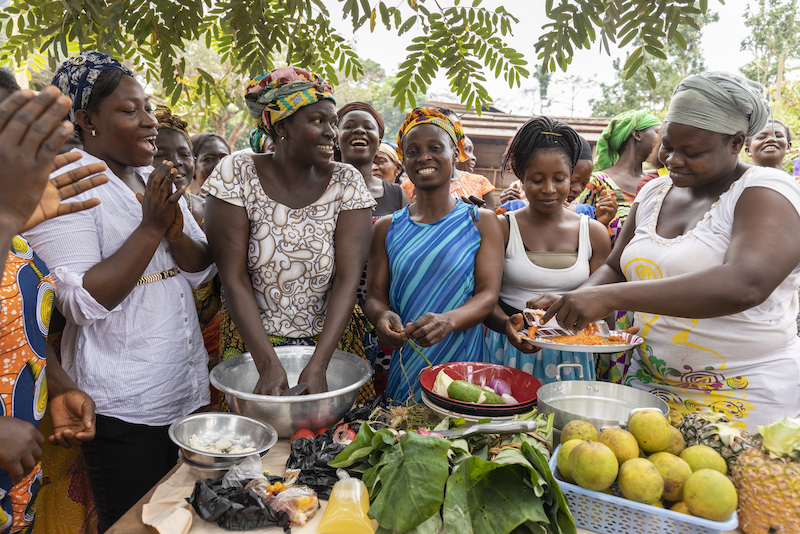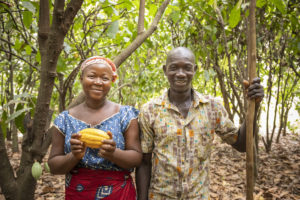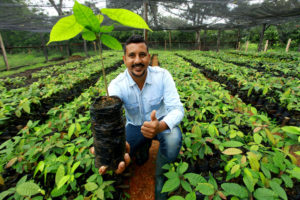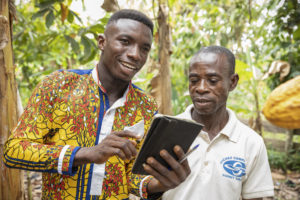Cargill drives momentum with ongoing cocoa sustainability schemes

Ethical sourcing of cocoa remains a core issue for the sector, with manufacturers including Cargill, a sponsor of this year’s World Confectionery Conference, revealing its ongoing initiatives. Editor Neill Barston speaks to Kate Clancy (below), company sustainability manager, on tackling child labour, and supporting key producing communities

As the results of a major study from Cargill recently found, a total of 70% of consumers in Europe are now actively factoring sustainability into their product choices, including chocolate. The survey of more than 7,000 people highlighted the fact that people are now more alive than ever to the realities of the significant inequalities that are a reality for those working at the sharp end of the industry supplying the global confectionery sector.
Notably, the company highlighted that ranges with strong sustainability credentials have taken on an increased importance, especially those businesses that are willing to invest in environmental or social initiatives that consumers can readily relate to.
The issue of engaging with consumers has become ever-more under the spotlight, and the survey in 10 European countries, found an even higher general response to chocolate products – with nearly three quarters of people reporting they prefer to buy sustainable products. This pattern was particularly the case with the 18-34 year-old age bracket, with younger consumers seen as being the most in tune with environmental issues. “Consumer expectations are higher now than ever before,” said Niels Boetje, managing director Cocoa at Cargill.
“Our research suggests that increasingly, consumers look for responsibly sourced brands, backed by concrete claims and compelling stories that connect the products they purchase with tangible progress on critical issues like child protection and deforestation elimination.”

Significantly, among younger consumers, 76% acknowledged sustainability has become more important to them in the past year when choosing chocolate products, with just over half of these Gen Z and millennial shoppers reporting a corresponding uptick in sustainable product purchases.
Within chocolate, consumers’ affinity for products perceived as sustainable was even more apparent. As the company highlighted, flavour and price of ranges also remain dominant factors, those who responded to its survey in fact ranked environmental and social sustainability on par with factors like nutritional value, brand name and previous product trial.

Ongoing mission
Speaking exclusively to Confectionery Production, Kate Clancy, sustainability manager at Cargill, explained that the company’s longstanding commitment to support cocoa growing communities has made encouraging progress.
Encouraged by the results of its study into consumers preferences, she explained that it had underlined the value of its work within key producing regions. She said: “The consumer study that our teams undertook is significant, as it reminds us that there’s a willingness and an interest from customers in sustainability – they can involve themselves by supporting sustainable solutions within the value chain.
“As a company, we produce a portfolio called The Cocoa Promise, which we offer to all sizes of customer across regions for them to purchase sustainable products, or get involved with sustainability project work through additional investment, and by doing that, they can understand the standards and conditions under which their cocoa is produced and its provenance,” explained Clancy, who recently spoke at the World Cocoa Foundation annual partnership meeting, where she noted the urgent need for combined work across the industry on delivering overall sustainability goals being targeted by the industry.
Significantly, she revealed that one of the most effective recent developments in relation to this has been the unveiling of its CocoaWise online portal.
As she added, this has been designed to further aid transparency of its sustainability work, as well as help build a lasting connection between farmers and consumers. This is achieved through real-time data revealing the locations of its farms across Ivory Coast, Ghana and Cameroon, which is supplemented with its beantracker, physically tracking each individual farm’s cocoa beans. Crucially, the latter measure has been put in place to ensure that beans from deforested areas do not enter the production chain – which remains a critical issue.
Furthermore, the company is also among the original signatories of the Cocoa and Forests Initiative (CFI), which has been agreed between major confectionery manufacturers, civil groups and the region’s governments, designed to further ensure the end deforestation. This remains a crucial issue, with sector reports highlighting that in the Ivory Coast has lost up to 80% of its core forests over the past five decades, with cocoa being one of the main culprits.
Another major matter addressed at the recent World Cocoa Foundation meeting was the recent US-based report from NORC at the University of Chicago into child labour within Ivory Coast and Ghana. Its troubling findings revealed that there were still major challenges on eradicating the problem – with a total of 1.56 million youngsters found to still be exposed to hazardous child labour practices in the region.

As Clancy enthused, Cargill continues to make headway on this as an integral part of its operations, working alongside global humanitarian organisation, CARE. According to their last joint report, between 2008-2018, their combined efforts had help reach more than 418,000 people, and 1,786,000 indirectly, through a host of programmes covering agriculture, economic empowerment, education, as well as water sanitation and hygiene initiatives, as well as working on child labour.
She noted: “We don’t tolerate child labour within our supply chain, and it’s something we have been working on for a number of years. I don’t think the sector fully appreciated some of the complexities in tackling in such an issue. “Cocoa is being produced in less developed countries, by smallholder farmers on a couple of hectares of land, their farming practices are not particularly modernised. There are not necessarily a lot of opportunities to generate additional income, and so what we realised some of the factors creating risk of child labour are surrounding poverty.
“We’re about to release our latest decade of impact report with our partner CARE, which we look at a lot of prevention measures. One of the ways that you can reduce child labour is through education, and actually ensuring the environment is there for them – that there is a school, teachers and books for them, and that they’re enrolled,” enthuses the sustainability specialist. She notes that one of the main indicators of children being at risk from experiencing being in child labour was the absence of formally being registered at their nearest school.
Empowering women
As well as addressing conditions for children, the company has also placed significant emphasis on providing support for women in cocoa growing communities.
According to Clancy, this approach is also having a positive impact on preventing poverty through helping raise household incomes, and specifically supporting women in communities.
“Research we did with CARE a few years ago showed that Women spend most of their money on family education and nutrition and children, so if you can get more money into the hands of women, that will also impact on the risk factors for children,” she adds, revealing the company has also recently begun a scheme directed towards women which is focusing upon providing training on skills such as financial literacy, through to support on specific agricultural practices.
Notably, she explains that such initiatives, which also include opportunities for training on other work sectors including crafts-based potential employment, can prove effective if linked to wider engagement with small and medium-sized enterprises in the community, as well as working closely with governments to ensure any such programmes are joined-up in their delivery.
Implementing schemes
Encouragingly, she appears notably optimistic that the core areas of focus that the business is making on sustainability, alongside other major manufacturers, and civil organisations, is making a difference to communities in its supply chains.
“Over the past few years, the sector has been very successful at implementing child labour remediation schemes, aiming at using data to target interventions, surveying farmers that observes them rather than taking a punitive approach in order to understand why child labour is happening,” she said represented a notable shift in how the issue is being addressed in the wider community context.
As she reveals, the information which is gathered in such exercises is then taken to deliver specific targeted interventions, which she describes as ‘powerful tools’ used by the industry.
Significantly, she cites the company’s own roadmap scheme that aims to have its entire cocoa supply chain covered by such remediation frameworks by 2025 in order to drive further impact on the issue.
“I have a lot of confidence in the progress that we will be making, just given how rapidly we have introduced these new models, and how much willingness there within the sector to share learning and data to help us understand how we can scale these systems and to make sure they are efficient,” she adds of the company’s approach.
Living income
As previously reported, another major matter to have hit the spotlight for sustainability within the cocoa sector has been the emergence of the Living Income Differential (LID).
Under the newly-established scheme forged by Ghana and Ivory Coast governments, confectionery manufacturers pay a premium of $400 a tonne of cocoa supplies, which it is hoped will address the considerable income gap – which was recently put at $10 billion in a study from Mondelez International.
Clancy concluded that price is just one element of the problem, though affirms the company’s commitment to the LID payments, alongside a strategy of encouraging agricultural diversity and working closely with governments in Ivory Coast and Ghana.
Through such a combination of actions, she adds that there’s genuine optimism for continuing the strong progress made so far in the ongoing quest for supply sustainability.
